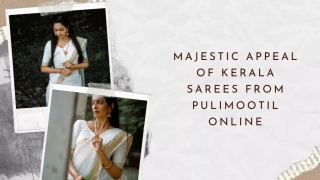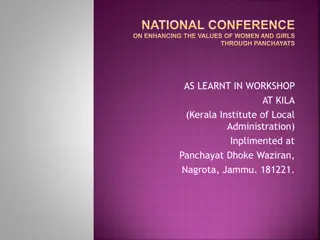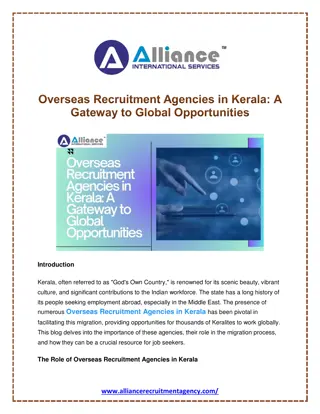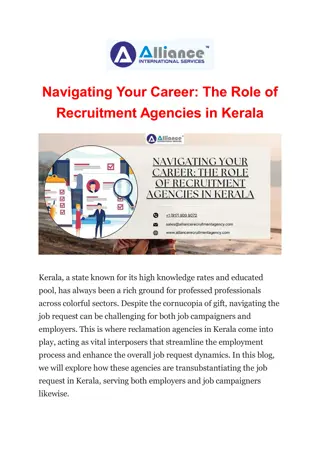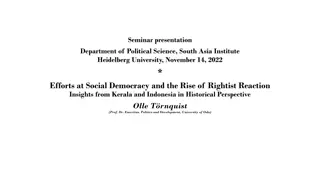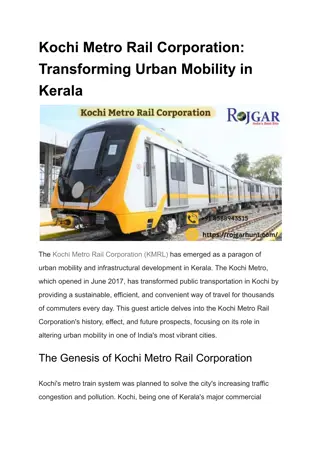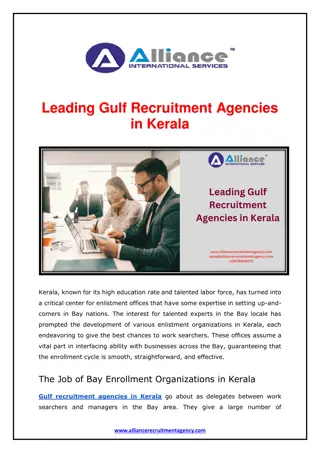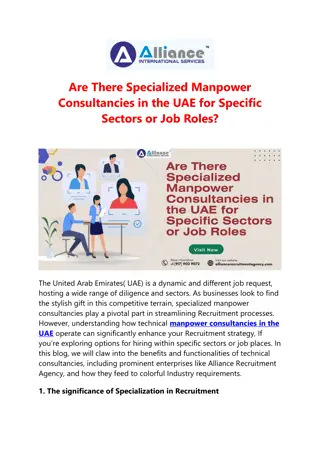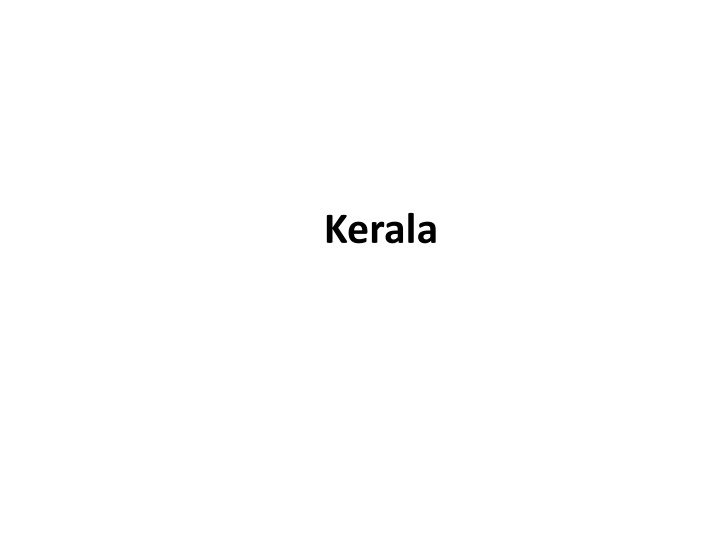
Improving Healthcare Services in Kerala: Key Findings and Actions Taken
Discover the major findings and actions taken to enhance healthcare services in Kerala, addressing issues such as under-utilization of facilities, inadequate HR support, and more. Explore initiatives like newborn screening, gender-based violence management, and practical approaches to health assessment. Learn about challenges and steps towards improvement in the healthcare system.
Download Presentation

Please find below an Image/Link to download the presentation.
The content on the website is provided AS IS for your information and personal use only. It may not be sold, licensed, or shared on other websites without obtaining consent from the author. If you encounter any issues during the download, it is possible that the publisher has removed the file from their server.
You are allowed to download the files provided on this website for personal or commercial use, subject to the condition that they are used lawfully. All files are the property of their respective owners.
The content on the website is provided AS IS for your information and personal use only. It may not be sold, licensed, or shared on other websites without obtaining consent from the author.
E N D
Presentation Transcript
Best Practices New Born Screening through Public Health Labs and Newborn Screening for Neurological disorders & Follow up clinic at W&C Hospital funded by District Panchayat Life-style Education and Awareness Program (LEAP) for students Systematic Health Assessment for Police Personnel (SHAPE) Practical Approach towards Lung Diseases (PAL) District level Gender Based Violence Management (GBV) Centers (Bhoomika) Day care centre for mentally challenged (Pakalveedu) Fertility clinic, Autism Clinic at W&C Hospital, Kollam
Major Findings Under-utilization of CHCs/PHCs leading to over-crowding at higher level facilities and OOPE for beneficiaries Most of the CHCs/PHCs are providing only OPD services Deliveries infrastructure not being conducted despite adequate RCH services, Family Planning services (IUCD insertion, abortion care) not being provided Non-availability transportation of patients of dedicated ambulance services for Free referral transport services under JSSK is not yet initiated
Major Findings Non availability of L1, L2 facilities & SNCU in Idukki District Non-availability of adequate blood banking and blood storage facilities in Idukki District Shortages of essential drugs at facilities & warehouses Free Diagnostic Services not implemented yet Varied user charges for lab services in both districts visited UPHCs, though functional, have not implemented national programs for disease control
Major Findings Inadequate HR sanctions, especially for high case load facilities Irrational deployment of available HR especially in CHCs Ineffective Supportive Supervision No system of structured visits or feedback mechanism Untied Funds, although approved, were not disbursed to the facilities High Priority Districts not allocated 30% higher per capita budget than other districts
Action Taken on 8th CRM Recommendations Recommendation Action Taken Improve quality of delivery services in CHCs & PHCs Not seen as no deliveries observed in CHCs& PHCs Regulation of Private Sector Dedicated ASHA support structure CEA not implemented No action taken Strengthening supportive supervision & integrated visit plans No action taken Emergency response system No action taken Online stock indenting mechanism and prescription audit Partial implementation of DDMS seen
KEY OBSERATIONS - CHALLENGES CRM VISIT SL.NO CRM COMMENTS REPLY 1 Under utilization of CHCs for IP care, delivery services IPHS standards in CHC are not being followed in Kerala. This is primarily because of the peculiar Health Seeking Behaviour of the people of Kerala as well as proximity of Taluk and other higher level institutions. However, as a part of attaining a lower rate of MMR, the state is taking concerted efforts on many fronts. In this context, it is proposed to conduct a gap analysis to find out the necessity for more delivery points especially at CHC level institutions. After ascertaining this, necessary actions will be taken.
SL.NO CRM COMMENTS REPLY Inadequate HR sanctions, especially for high case load facilities & Irrational deployment of available HR 2 A rational deployment is being worked out
SL.NO CRM COMMENTS REPLY 3 Shortages of essential drugs, especially of faster moving NCD drugs, at facilities & warehouses. Lead time for quality test not maintained for supply of drugs from drug warehouses. In 2017-18 the Corporation had ensured the availability of all NCD items by the beginning of the financial year itself. The annual requirement for the current year is for Rs.12.1 Cr for NCD items. Items worth Rs.5.6 Cr have already been issued to institutions and presently there is a stock of Rs.5.5 Cr worth of items available at the warehouses across the State.
SL.NO CRM COMMENTS REPLY 3 Shortages of essential drugs, especially of faster moving NCD drugs, at facilities & warehouses. Lead time for quality test not maintained for supply of drugs from drug warehouses. Accordingly additional procurement of NCD drugs have been made by the corporation through Karunya Pharmacies. Apart from routine inventory as part of NPCDCS & NPHCE programmes, Corporation was entrusted with the task of additional purchase of NCD items by NRHM worth Rs 2.09 Cr. Out of this, items worth Rs.1.57 Cr has already been distributed to institutions in all 14 districts. The distribution of the balance items worth Rs.43 lakhs will be completed by 15th June 2017.
SL.NO CRM COMMENTS REPLY The issue of ambulance network is being addressed now. 4 Non- availability of a well-connected ambulance network No untied funds for facilities and limited fund availability for smaller but quality oriented works An amount of Rs.455.20 lakhs is proposed during 2017-18 as untied funds to Subcentre, PHC and selected CHCs. 5
SL.NO CRM COMMENTS REPLY 6 Standard Treatment Guidelines & Management Protocols not available or adhered to. Standard treatment guideline is available for all national programmes. All health care institutions follow the treatment guidelines in the implementation of health programmes. A protocol for the treatment of Common communicable diseases has been developed (short Febrile illness, Malaria, Dengue fever, Scrub Typhoid, Leptospirosis, Diarrhoeal disease, H1N1) Protocol for treatment of DM and HT also developed. Treatment protocol for treatment of hypertensive disorders at pregnancy and PPH also developed and implemented.
SL.NO CRM COMMENTS REPLY Funds provided for making a blood bank at Adimali. The blood bank will be augmented shortly. 7 Non availability of adequate blood banking and & blood storage facilities in Idukki Non availability of L1, L2 facilities & SNCU in Idukki As per the peculiar health seeking behaviour of people in Kerala, no deliveries happen in Sub centres while very few CHCs provide delivery services. Delivery services are provided in Taluk and higher level hospitals only. Hence L1, L2 facilities are not being augmented in the State. Further, Kerala has proposed SNCU in Idukki district in 2017-18 PIP. 8
SL.NO CRM COMMENTS REPLY As per the National RBSK guideline, a dedicated RBSK Mobile Health Team (MHT) is responsible for the primary RBSK screening. But in Kerala, we had dedicated RBSK Nurses instead of MHT. In the current year (2017-18) the state has proposed 17 MHT for difficult rural, tribal vulnerable areas where the RBSK services are poor. With this MHT, the state will be able to screen all children in the vulnerable areas. And also RBSK is focusing on strengthening on Early Intervention Services, for this state already started visible & functional birth defect screening, Audiometric screening, IEM screening at delivery points and screening of all children come to public health facilities for routine immunization. 9 RBSK nurse not fulfilling objectives of the RBSK team Contd..
SL.NO CRM COMMENTS REPLY And the RBSK nurses are directed to work for more days in AWCs and preschools in order to screen the children for 4Ds at the earliest. CHD is one of the major causes for infant deaths in Kerala, along with visible & functional birth defect screening; state included the parameters of CHD symptoms and vital signs in the screening format. State is already empanelled with SCTIMST for RBSK tertiary care services and 4 private tertiary care centers are shortlisted for empanelment of CHD surgeries under RBSK scheme. 9 RBSK nurse not fulfilling objectives of the RBSK team As per the above activities, the state RBSK programme is fulfilling the actual objectives of RBSK scheme.
SL.NO CRM COMMENTS REPLY Vector Borne Disease Control : In the immediate post CRM period, a two days hands on training was given to all the UPHC lab technicians on malaria microscopy, filarial diagnosis and dengue fever. This was in collaboration with the state NVBDCP unit. Subsequent to the training additional equipments, lab reagents and test kits are being provided to the UPHC labs for facilitating diagnosis and case management. Outreach and source reduction activities are intensified (in convergence with ULBs) in all urban centres to control the VBDs. UPHCs are made functional units of IDSP and reporting started. 10 UPHCs functional, but not implementing national programmes for disease control. Contd..
SL.NO CRM COMMENTS REPLY 10 UPHCs functional, but not implementing national programmes for disease control. Tuberculosis : Many of the UPHCs are functioning as DOTS providers under RNTCP. Services are provided to the MDR TB cases reported in the UPHC catchments. Curriculum is being readied to offer training to lab technicians associated with NUHM on sputum microscopy for pulmonary tuberculosis. Training to UPHC Medical Officers : Training provided to the UPHC Medical Officers on short febrile illnesses including ILIs to augment the management of such cases at UPHC level. Contd..
SL.NO CRM COMMENTS REPLY HIV/AIDS and Common Communicable Diseases : Joint intervention started among internal out migrants(those from the states of Assam, Bihar, Jharkhand, West Bengal etc.,,)with the State AIDS Control Society on prevention of STDs including HIV and common communicable diseases. It began as a work site intervention which is going to be extended to the inhabitation areas(camp sheds) also soon. 10 UPHCs functional, but not implementing national programmes for disease control. NLEP : A training manual is released in collaboration with the state NLEP Cell for urban leprosy management and screening for leprosy is carried out in the special outreach medical camps.
SL.NO CRM COMMENTS REPLY During the year 2016-17, an amount of Rs.27788 lakhs were allocated to the districts, of which Rs.9784.96 lakhs is for the High Priority Districts, which means that the allocation to HPDs is more than 23% compared to other districts. 11 No higher fund allocation made for HPDs
SL.NO CRM COMMENTS REPLY There was an approval of Rs. 11.29 crores for Untied/Annual maintenance grant/HMS for the financial year 2015- 16. But due to the Shortage of funds and lagging of funds released from GOI through treasury these funds not released to health institutions. SHS is received the activity approval (Record Of Proceedings) for the financial year 2015- 16 on 11.05.2015, and state society received first release of grants on 01.10.2016 through treasury - after the second quarter. 12 Non-distribution of Untied Funds to facilities in 2015-16, despite approval Contd..
SL.NO CRM COMMENTS REPLY At that time there were huge amount of expenditure of many flagship programmes and salaries which are to be recouped. SHS received its second release on 1st of February 2016. At that time with this limited resources state has prioritized its activities which are to be completed before 31st March 2016. Moreover, the state share due amounting to Rs.141.03 crores received during 2016-17 only. In addition to this in Kerala, Panchayath Raj is more strong and in most of the health institutions they are getting panchayath funds for maintenance. So during FY 2015- 16 PROs were more sensitized to raise funds from panchayaths for maintenance of the hospitals. 12 Non-distribution of Untied Funds to facilities in 2015- 16, despite approval
SL.NO CRM COMMENTS REPLY The Concurrent Audit mechanism has been started in the state during 2008-09 as per the guidelines from GOI and has been carried out on a monthly basis at state and District level. The audit also covers all the Disease Control Programmes and Non Communicable Disease Control Programmes are covered. The auditors are appointed within the districts so as to cover the entire institutions in a year. In-effective concurrent audit mechanism 13 Contd..
SL.NO CRM COMMENTS REPLY During 2016-17, State Society has given instructions for covering all the institutions on a half yearly basis. The audit plan include all PHCs/ CHCs, sub- centres and WHSNCs located within the blocks, so that all PHCs/CHCs will be audited two times a year and Sub Centres/ WHSNCs will be audited once after 100% utilisation of funds received or at the end of the year. Instructions has also been given to the districts to confirm that the Annual Financial Statements at DHS level are consolidated on the basis of audited districts accounts and not on the basis of expenditures reported by the blocks & districts. In-effective concurrent audit mechanism 13
SL.NO CRM COMMENTS REPLY Presently the selection of Govt agency for civil work is done after obtaining competitive offer for the centage charges. charges are fixed as per the G.O(P)No.311/14/Fin dtd 30/7/2014 14 Selection of Govt. agency for civil work without obtaining offer of centage charges The centage
SL.NO CRM COMMENTS REPLY Generally the procurement of equipments for all public healthcare institutions under the Health department are done through M/s Kerala Medical Services Ltd (KMSCL) is the central; procurement agency, as per GO (MS) No.448/2007/H&FWD dated 01.11.2007, KMSCL follows e-tendering procedures to purchase various equipment and finalize Running Contract. Procurement of equipments & services without following proper competitive bidding procedures in districts 15 In districts, procurement of equipments are doing by following Store Purchase Rules, Government of Kerala. DETAILS IN NEXT SLIDE Non-differential financing for transportation under JSSK 16
As per the norms of GOI the JSSK benefits are provided to the beneficiaries at the following rates. JSSK Split up Normal/ delivery Caesarean/ delivery A.1.7.1 Drugs and Consumables 350 1600 A.1.7.2 Diagnostic 200 200 A.1.7.3 Blood Transfusion 300 300 A.1.7.4 Diet 300 (3 days for Normal Delivery ) 700 (7 days for Caesarean) A.1.7.5 Referral Transport Up & down 500 500 Total 1650 3300 The funds are given to the institutions as a package and Rs.500/- is giving for transport facility per patient irrespective of the distance covered. The amount given is already very minimal compared to the actual fare incurred and the maximum limit is Rs.500/- only. Hence the uniform rate is provided.
Action Taken on 8th CRM Recommendations SL.NO RECOMMENDATION COMMENTS FROM GOI Not seen as no deliveries observed in CHCs & PHCs REPLY IPHS standards in CHC are not being followed in Kerala and hence delivery services are not available in majority of the CHCs in the State. This is primarily because of the peculiar Health Seeking Behaviour of the people of Kerala as well as proximity of Taluk and other higher level institutions. However, as a part of attaining a lower rate of MMR, the state is taking concerted efforts on many fronts. In this context, it is proposed to conduct a gap analysis to find out the necessity for more delivery points especially at CHC level institutions. After ascertaining this, necessary actions will be taken. Improve quality of delivery services in CHCs & PHCs 1
SL.NO RECOMMENDATION COMMENTS FROM GOI CEA not implemented No action taken REPLY CEA is in the process in State Assembly. The District Coordinators were appointed in January 2014 and placed in district for coordination programme. At Block level Block coordinators coordinating the programme 2 Regulation of Private Sector ASHA 3 Dedicated ASHA support structure the of overall ASHA are
SL.NO RECOMMENDATION COMMENTS FROM GOI REPLY No action taken Regular visits by State & District level officers are happening now in the State. Further, meetings at State, District, Block and institution level are being conducted every month for which at least one officer from the higher level participate. Information received from higher authorities disseminated meetings. Further, for all issues raised in these corrective actions are being taken at the higher level on a regular basis. 4 Strengthening supportive supervision & integrated visit plans regular institution will are during these meetings,
SL.NO RECOMMENDATION ACTION TAKEN No action taken REPLY The issue of having an Emergency response system is being addressed now. Emergency response system 5 Partial implementation of DDMS seen For managing and monitoring the drug procurement and distribution activities of the institutions under the Director of Health Services and Director of Medical Education, online Drug Distribution System software application has been implemented at all institutions. Government Order No. GO (Rt) No.1018/2017/H&FWD 06.04.2017 has also been issued in this regard. 6 Online stock indenting mechanism and prescription audit Management dated




